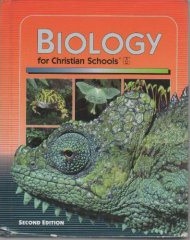 Cover | |
| Author | William S. Pinkston |
|---|---|
| Language | English |
| Subject | Biology |
| Publisher | Bob Jones University Press |
Publication date | January 1991 |
| Publication place | United States |
| Media type | Print (Hardcover and Paperback) |
| Pages | 693 |
| ISBN | 0-89084-556-5 |
| OCLC | 33968587 |
| 574 20 | |
| LC Class | QH308.2 .P56 1994 |
Biology for Christian Schools is a 1991 school-level biology textbook written from a Young Earth Creation point of view by William S. Pinkston and published by the Bob Jones University Press. The book has been controversial because it espouses the idea of Biblical inerrancy; that whenever science and Christianity conflict, the current scientific understanding is wrong. [1] The book promotes creationism, which is rejected by the National Academy of Sciences, the National Association of Biology Teachers and the National Science Teachers Association who state creationism and intelligent design are pseudoscience. [2]
Contents
Francisco J. Ayala, a biologist at University of California, Irvine, wrote the book "rejects generally accepted scientific knowledge" and "explicitly rejects the scientific methodology generally accepted by the scientific community." [3]